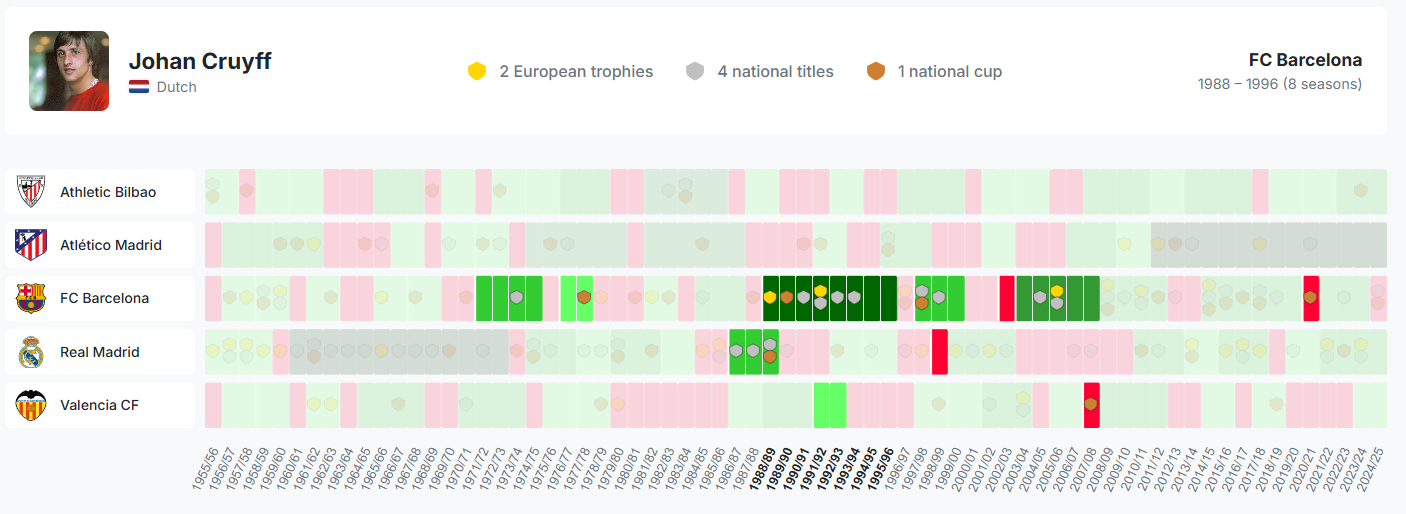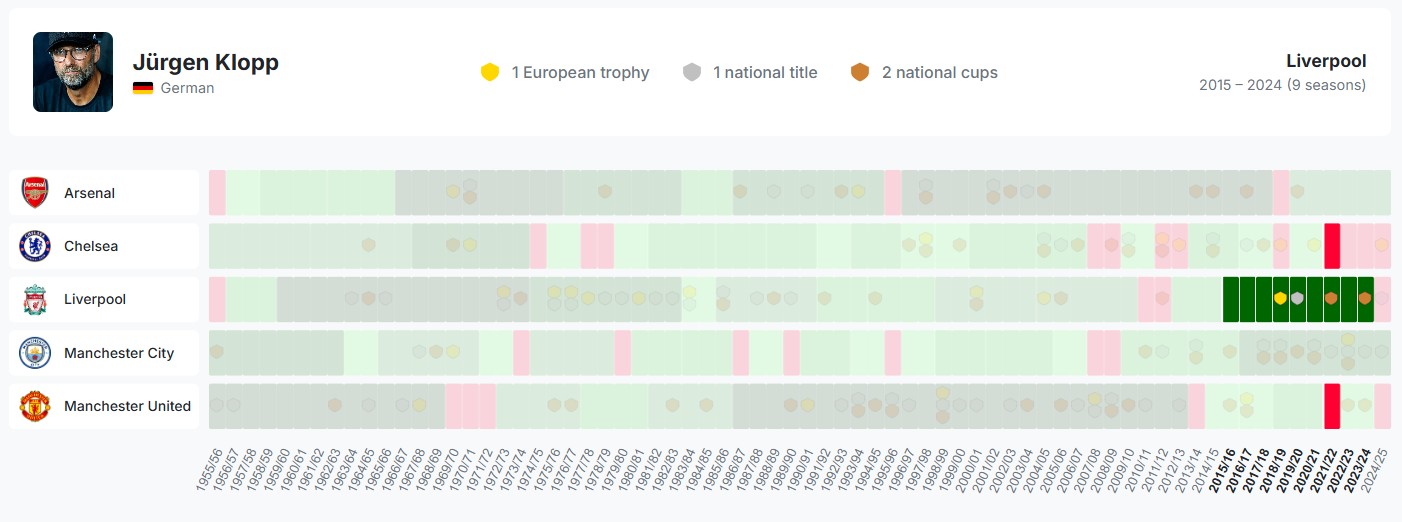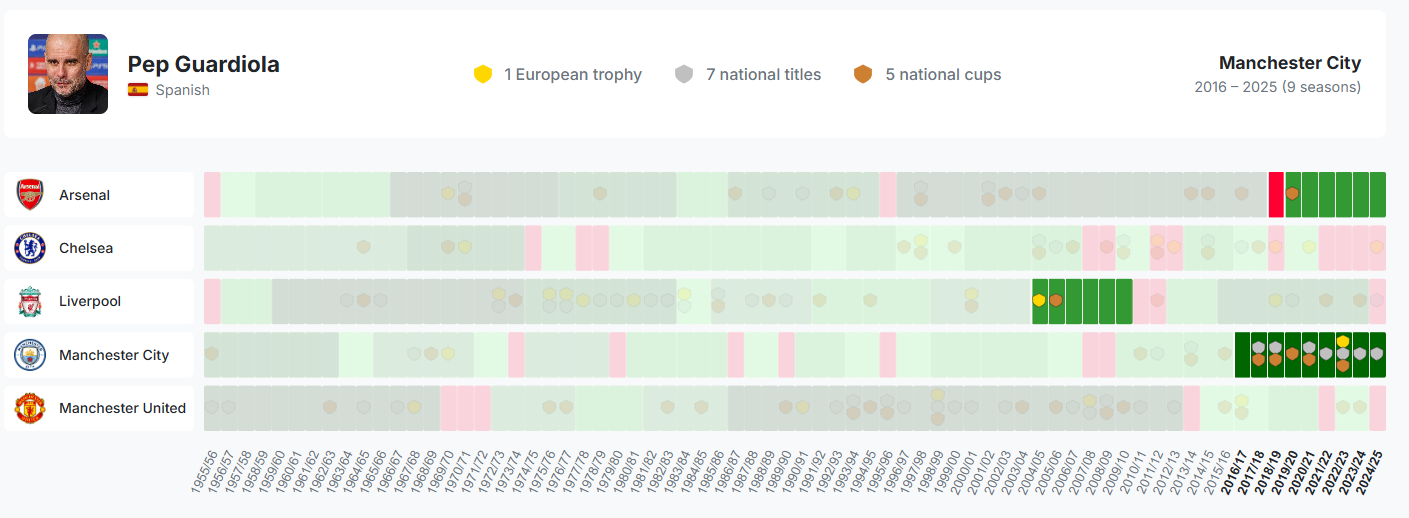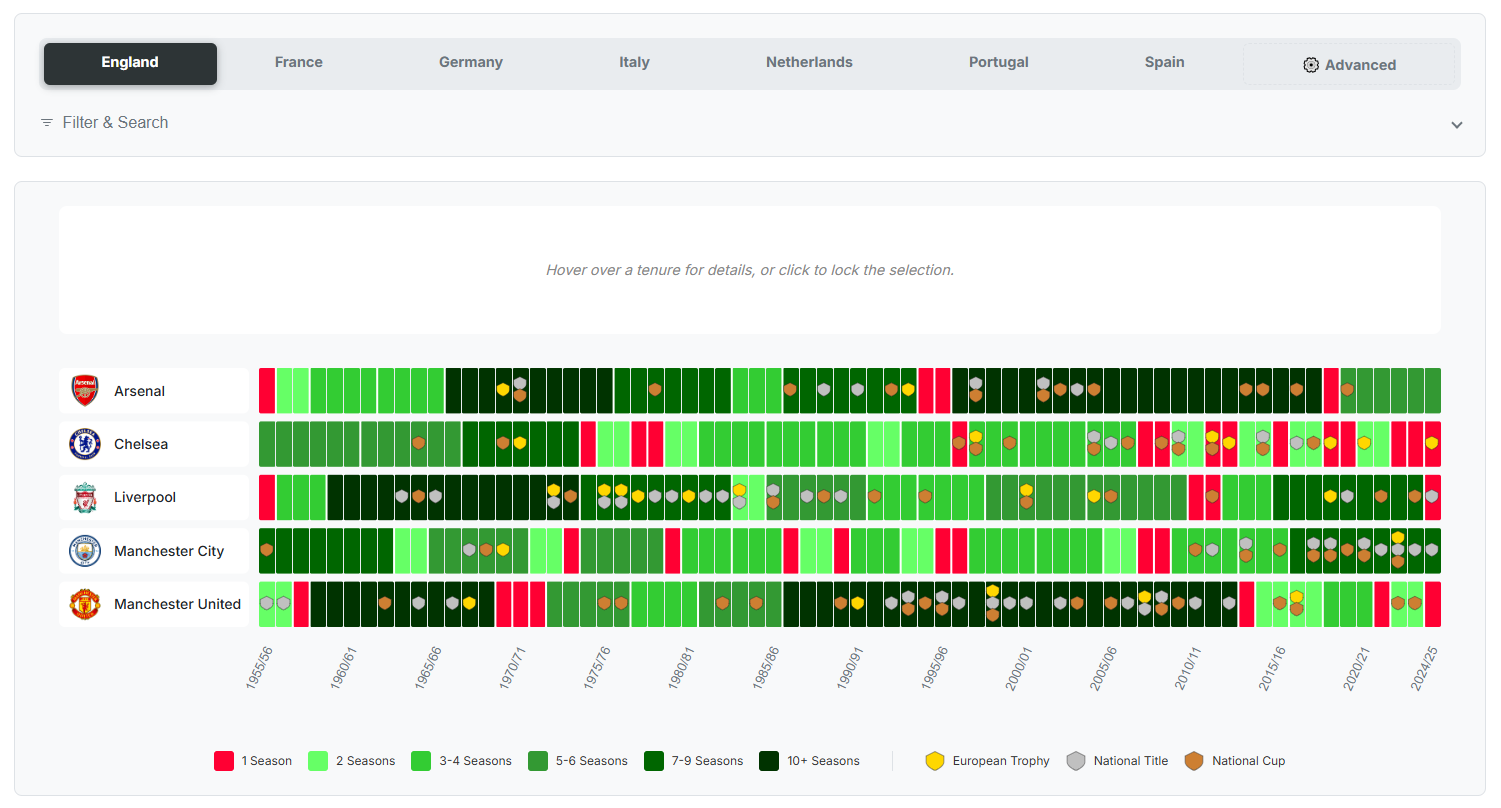In football, ideas travel. A tactical innovation born in Amsterdam can find a home in Barcelona, while a pressing system perfected in Mainz can conquer Liverpool. The modern game is a melting pot of philosophies, often imported by the managers themselves. These coaches are more than just employees; they are cultural ambassadors, carrying a distinct footballing identity across borders.
But which nations are the most successful exporters of tactical DNA? And which leagues are most open to foreign influence? Our data, covering nearly 70 years across a sample of 35 major clubs (five per country) in Europe's top leagues, reveals some stark contrasts. Based on this sample, the English Premier League stands out as the ultimate melting pot, with a staggering 64% of its coaching positions held by foreigners. At the other end of the spectrum, France's Ligue 1 appears the most insular, with only 21% of its top club managers coming from abroad. It's important to note this reflects the top clubs, and the picture across the entire league might differ.
Let's dive into the data to trace the influence of the Dutch, German, Italian, Spanish, Portuguese, and French coaching schools across the continent.
The Dutch School: An Orange Blueprint for Success
For decades, Dutch football has been a byword for innovation. From "Total Football" to the modern possession-based game, its influence is undeniable. The data shows this isn't just a philosophy; it's a highly successful export product. The story begins with two titans: Rinus Michels and his most gifted student, Johan Cruyff. Michels laid the groundwork at Barcelona in the 70s, but it was Cruyff who, upon his return as manager in 1988, built the "Dream Team" and cemented an ideological bond between Ajax and Barcelona that persists to this day.

This Dutch influence peaked in the late 90s and 2000s. Louis van Gaal, fresh from his Champions League victory with Ajax, brought his rigid, philosophical approach—and a host of Dutch players—to Barcelona, where he won two league titles. A decade later, our data shows him repeating the feat in Germany with Bayern Munich, winning the double in 2010. His compatriot, Frank Rijkaard, offered a calmer, more player-centric version of the Dutch school and led a Ronaldinho-inspired Barcelona to a Champions League title in 2006. Even Ruud Gullit had a taste of success abroad, winning the FA Cup with Chelsea as a player-manager.
Not all Dutch exports were an unqualified success. The data shows that Peter Bosz, successful in the Netherlands, had more difficult spells abroad at Borussia Dortmund and Olympique Lyonnais. Ronald Koeman's time at Valencia was turbulent, despite winning the Copa del Rey. Yet, the demand for Dutch know-how persisted. Guus Hiddink had a brief, trophyless spell at Real Madrid but later won the FA Cup with Chelsea. Even the more pragmatic Dutch coaches like Dick Advocaat, Huub Stevens, and Bert van Marwijk found work across the border, while Leo Beenhakker managed to win the league with Real Madrid.
The newest wave continues this tradition. Erik ten Hag, despite constant criticism of his style, ended a five-season trophy drought at Manchester United by winning two cups in his first two years. And Arne Slot, who won the title in his debut season with Liverpool, proves that the allure of the Dutch tactical school remains as strong as ever.
Data Focus: The Coaching Trade Balance
Based on a sample of 35 clubs across 7 leagues since 1955.
Top 5 Exporting Nations (by foreign stints)
- 1. Argentina: 38 stints (Mainly to Spain and Italy)
- 2. Brazil: 26 stints (Mainly to Portugal)
- 3. Netherlands: 25 stints (Popular in Germany and Spain)
- 4. Scotland: 17 stints (Almost exclusively to England)
- 5. Italy: 15 stints (Spread across England, Spain, and France)
League Openness (% foreign coaches)
- Most Open: England (64.0%), Portugal (48.2%), Spain (44.1%)
- Most Closed: France (21.1%), Netherlands (24.6%), Italy (28.9%)
The German Gegen-Wave: Heavy Metal Football Takes Over
If the Dutch taught Europe how to play with the ball, the Germans taught them how to win it back. While pioneers like Udo Lattek (Barcelona) and Jupp Heynckes had already found success abroad—with Heynckes famously winning the Champions League with Real Madrid in 1998—the modern era is defined by the "Gegenpressing" revolution.
This wave was spearheaded by two managers forged in the same crucible: Jürgen Klopp and Thomas Tuchel. Both honed their craft at Mainz 05 before making their names at Borussia Dortmund. Klopp arrived at Liverpool in 2015 and famously described his philosophy as "heavy metal football." He promised to turn "doubters into believers," and he delivered, winning both the Champions League (2019) and Liverpool's first league title in 30 years (2020). Tuchel followed a similar path, taking his intense, tactically flexible approach to PSG and then winning a Champions League with Chelsea in 2021 just months after taking over.

The data shows a clear trend: where German coaches go, intensity and tactical discipline follow. Ralf Rangnick, considered the godfather of this pressing style, had a brief consultancy at Manchester United in an attempt to import the philosophy wholesale. Meanwhile, Roger Schmidt's recent title success with Benfica proves the effectiveness of the German model beyond just the top-tier leagues. Even Hansi Flick, who led Bayern to a historic sextuple, has now exported his winning mentality to Barcelona.
The Italian Job: Pragmatism as a Passport
Italian coaches have long been stereotyped as defensive masters of "Catenaccio." While there's a kernel of truth in their tactical discipline, the data reveals their greatest strength is actually a relentless, adaptable pragmatism. They don't export a single philosophy; they export winning.
The legendary Giovanni Trapattoni is a prime example. After dominating with Juventus, he won league titles in Germany with Bayern Munich and in Portugal with Benfica, adapting his style each time. But the ultimate chameleon is Carlo Ancelotti. The data shows him winning major honours in Italy (AC Milan), England (Chelsea), France (PSG), Germany (Bayern Munich), and Spain (Real Madrid)—a feat no other manager has accomplished. His genius lies in his serene man-management, calmly handling dressing rooms full of superstars and finding a system that fits them, rather than forcing them into his.
The Spanish Armada & The Portuguese Wave
For decades, Spain exported world-class players, but not necessarily coaches. That changed dramatically with one man: Pep Guardiola. His revolutionary success at Barcelona created a global demand for Spanish coaches. Guardiola himself became a top export, dominating the Bundesliga with Bayern Munich and then creating an era of unprecedented success at Manchester City. He paved the way for others like Luis Enrique (PSG) and European specialist Unai Emery (PSG, Arsenal). Before them, Rafael Benítez had already shown that Spanish tactical intelligence was a valuable commodity, famously winning the Champions League with Liverpool in 2005.

Simultaneously, Portugal has emerged as a modern powerhouse of coaching talent. The data is dominated by one figure: José Mourinho. His journey from Porto to Chelsea, Inter, Real Madrid, and Manchester United is a masterclass in winning through pragmatic, often confrontational, tactics. But he is not alone. A new generation, including André Villas-Boas (Chelsea, Marseille), Paulo Fonseca (Roma), and the highly-rated Rúben Amorim, whose success at Sporting CP earned him the top job at Manchester United, has successfully managed top clubs across Europe.
French Exceptionalism: A Paradox of Talent
The French story is a paradox. While France produces a seemingly endless stream of world-class players who dominate leagues across the continent, the nation has been a modest exporter of top-tier coaching talent. Our data shows that top French clubs historically prefer domestic managers, making Ligue 1 the most "closed" league in our sample. This doesn't necessarily mean French coaches lack ambition to go abroad, but it does paint a picture of a more inward-looking coaching culture compared to its neighbours.
However, the few who do venture abroad often make a significant, lasting impact, making them notable exceptions to the trend. The towering example is, of course, Arsène Wenger. His 22-year reign at Arsenal makes him an 'Architect' abroad, an anomaly who didn't just win trophies but reshaped the identity of a major English club. Gérard Houllier also found great success in England, leading Liverpool to a cup treble in 2001. Interestingly, both men coached only one club abroad for an extended, loyal period.
This pattern of loyalty to a single foreign club is mirrored by Zinedine Zidane. He achieved immense success at Real Madrid, the same club where he shone as a player, winning multiple Champions League titles. Finally, there is Didier Deschamps. While he has primarily found success in France, he had a crucial one-season spell at Juventus, where he successfully guided the club back to Serie A after their demotion. These men prove that French coaching possesses immense quality, but they remain rare, high-impact exports rather than a consistent wave. They are not journeymen, but rather icons who commit fully to a specific project abroad, often one with which they have a personal connection.
Conclusion: The Shifting Tides of Tactical Influence
Looking at the data over time, distinct patterns emerge. The 90s and early 2000s were marked by the widespread influence of the Dutch school. The last decade has been defined by the high-intensity German approach, the continued success of adaptable Italian pragmatists, and the rise of the Spanish possession game, with Portuguese coaches emerging as the new tactical heavyweights.
What drives these trends? Success is cyclical. A groundbreaking victory, like Arrigo Sacchi's Milan or Cruyff's Barcelona, creates a blueprint that others rush to copy. A nation's economic strength and the global appeal of its top league also play a role, turning managers into highly sought-after global commodities. Ultimately, success abroad is not just about tactical knowledge, but about the ability to communicate a clear idea, adapt to a new culture, and, above all, win.
Explore the Data Yourself

Our interactive tool allows you to explore club histories, filter by nationality, or track a manager's career. Dive in and discover the patterns for yourself.
Launch the Interactive Visualization